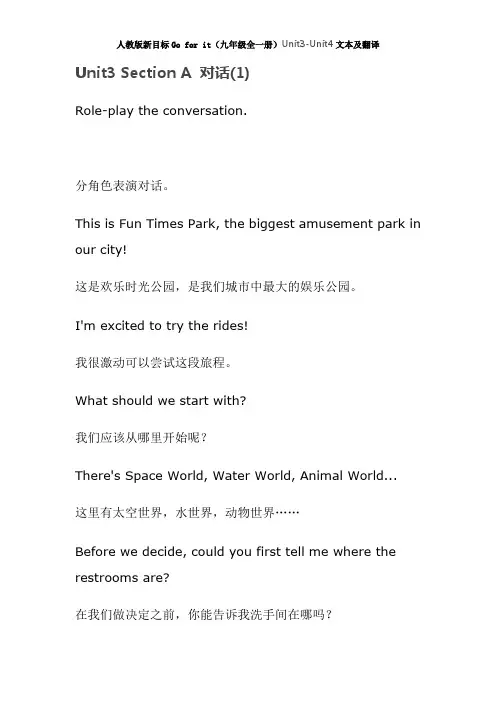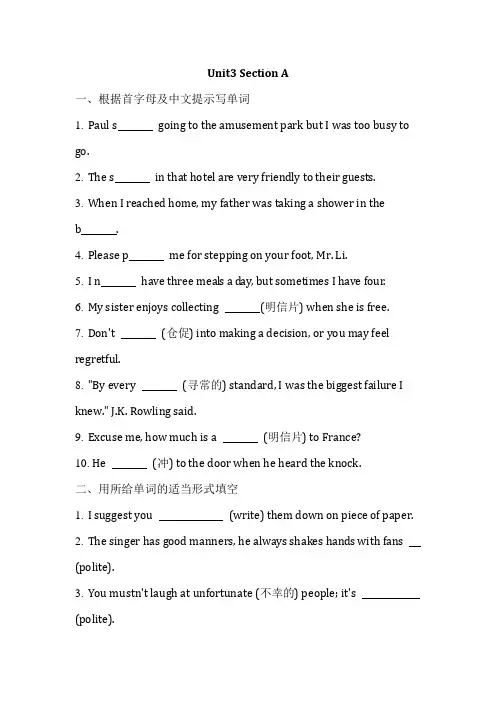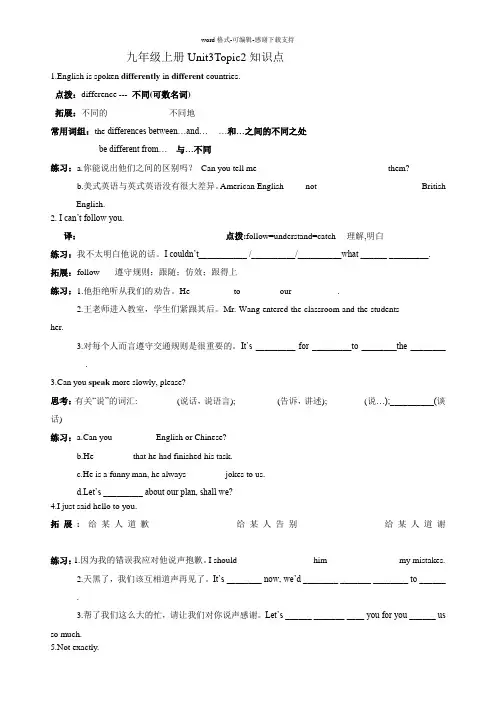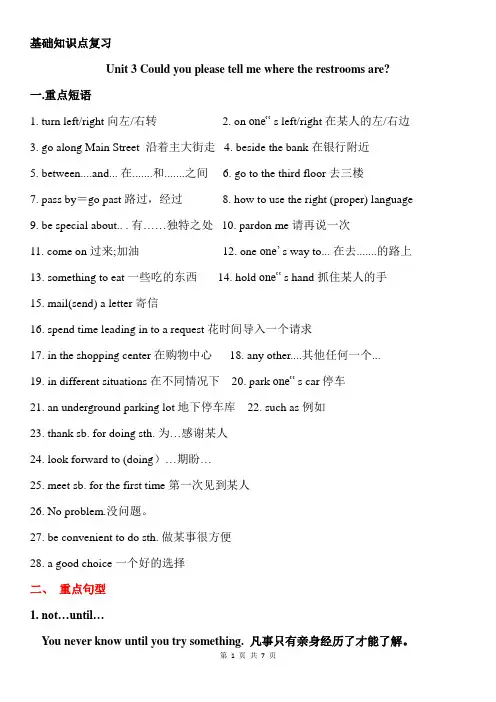(完整word)2014人教版九年级英语Unit3英汉互译
人教版新目标Go for it(九年级全一册)Unit3-Unit4文本及翻译

Unit3 Section A 对话(1)Role-play the conversation.分角色表演对话。
This is Fun Times Park, the biggest amusement park in our city!这是欢乐时光公园,是我们城市中最大的娱乐公园。
I'm excited to try the rides!我很激动可以尝试这段旅程。
What should we start with?我们应该从哪里开始呢?There's Space World, Water World, Animal World...这里有太空世界,水世界,动物世界……Before we decide, could you first tell me where the restrooms are?在我们做决定之前,你能告诉我洗手间在哪吗?Pardon? Restroom? You want to rest?什么?休息室?你想要休息吗?But we haven't even started yet!但是我们还没有开始呢!Oh no, I don't mean that.哦,不!我不是那个意思。
I mean... you know, a washroom or bathroom.我的意思是…你知道,洗手间或者厕所。
Hmm... so you mean... the toilet?嗯…所以你想上厕所?Yes! Sorry, maybe people in China don't often use the word "restroom" when they speak English.是的!抱歉,或许当中国人说英语的时候很少用"restroom"这个单词。
That's right. In China, we normally say "toilet" or "washroom" in English.是的。
人教版英语九年级Unit3 Section A B测试题附答案不全

Unit3 Section A一、根据首字母及中文提示写单词1.go.2.3.When I reached home, my father was taking a shower in the4.5.6.7.regretful.8.knew." J.K. Rowling said.9.10.二、用所给单词的适当形式填空1.2.(polite).3.(polite).4.difference between British English and American English sometimes.5.where the art room is?6.town?7.room.8.China.9.before yesterday?10.三、单项选择题1.It's _____ to take the subway to visit Paris. It can take you wherever you want to go.A.convenientB.inexpensiveC.crowded2.If a way of doing something is _____, it is very useful or suitable for a particular purpose.A.difficultB.convenientC.simple3.—Do you often visit your grandparents, Tom?—Yes. It's very _____ to go there by bus.A.difficultB.convenientC.busy4.—We can't live without trees. They make our lives _____.—I agree. We should stop people cutting down trees.A.majorB.harmfulC.convenient5.Although computers are _____ to us in our daily life, but they also cause other problems.A.convenientB.traditionalC.expensive6.It's _____ to live here. There is a shopping mall and a big supermarket near here.A.traditionalB.terribleC.convenient7.—Mr. Wang, can you tell me _____?A.why I can get the latest news about educationB.where can I search for the information about high schoolsC.where I can find out the exam scores8.—Sir, it's true that being happy is an ability. So can you tell me_____?—Yes. Just as President Xi says, "Happiness is achieved through hard work."A.how we can find happinessB.who can help achieve happinessC.why happiness is so important to us9.—Can you tell me _____?—Two weeks ago.A.when did you buy the toysB.how much the toys costC.when you bought the toys10.—_____ are you talking with?—Tracy.A.HowB.WhomC.Which四、语法填空Have you ever seen a hitchhiker (搭便车的旅行者) standing by the side of a road? Now drivers in Canada might see __1___ unusual hitchhiker; a hitchhiking robot.One of its inventors, David Harris Smith, has hitched across Canada three times. Smith and a friend, Frauke Zeller, have built Hitchbot because they wanted __2__ (see) if people would stop and give the robot a lift and talk to it. The robot can chat about things it has learned, and about ___3__ (it) trip. You might think it's a joke,__4___ Smith and Zeller's experiment has a serious point: can robots and people get along?Hitchbot __5___ (begin) its journey in Nova Scotia in July. It has already completed a third of its 6,000-mile trip to Victoria. More than 57,000 people are following its journey __6___ (close) on Facebook and Twitter, and travelers have posted lots of __7___ (photo) on the websites. Hitchbot has also done some shopping, eaten motor oil, and had fun with travelers. Nobody knows __8___ it will finish its journey. It might be __9___ (long) than expected, but Zeller and Smith wantHitchbot to get __10___ many rides as it can. It hasn't been in a self-driving car yet, but anything is possible!五、英汉互译1.我建议再尝试一次。
仁爱英语九年级上册Unit3Topic2知识点

九年级上册Unit3Topic2知识点1.English is spoken differently in different countries.点拨:difference ---不同(可数名词)拓展:不同的_____________ 不同地______________常用词组:the differences between…and… ---…和…之间的不同之处be different from…---与…不同练习:a.你能说出他们之间的区别吗?Can you tell me _______ ____________ _________ them?b.美式英语与英式英语没有很大差异。
American English ____ not _______ __________ _____ BritishEnglish.2. I can’t follow you.译:_______________________________ 点拨:follow=understand=catch ---理解,明白练习:我不太明白他说的话。
I couldn’t___________ /__________/__________what ______ _________.拓展:follow --- 遵守规则;跟随;仿效;跟得上练习:1.他拒绝听从我们的劝告。
He _________ to ________ our __________.2.王老师进入教室,学生们紧跟其后。
Mr. Wang entered the classroom and the students __________ her.3.对每个人而言遵守交通规则是很重要的。
It’s _________ for _________to ________the ________ ________.3.Can you speak more slowly, please?思考:有关“说”的词汇:_________(说话,说语言); _________(告诉,讲述); ________(说…);__________(谈话)练习:a.Can you _________ English or Chinese?b.He ________ that he had finished his task.c.He is a funny man, he always ________ jokes to us.d.Let’s _________ about our plan, shall we?4.I just said hello to you.拓展: 给某人道歉__________________给某人告别__________________给某人道谢_____________________练习:1.因为我的错误我应对他说声抱歉。
人教版九年级英语上册unit3基础知识复习及训练(含答案)

基础知识点复习Unit 3 Could you please tell me where the restrooms are?一.重点短语1. turn left/right 向左/右转2. on one‟ s left/right 在某人的左/右边3. go along Main Street 沿着主大街走4. beside the bank 在银行附近5. between....and... 在.......和.......之间6. go to the third floor 去三楼7. pass by=go past 路过,经过8. how to use the right (proper) language 9. be special about.. . 有……独特之处 10. pardon me 请再说一次11. come on 过来;加油12. one one’ s way to... 在去.......的路上13. something to eat一些吃的东西 14. hold one‟ s hand 抓住某人的手15. mail(send) a letter 寄信16. spend time leading in to a request花时间导入一个请求17. in the shopping center 在购物中心 18. any other....其他任何一个...19. in different situations 在不同情况下 20. park one‟ s car 停车21. an underground parking lot地下停车库 22. such as 例如23. thank sb. for doing sth. 为…感谢某人24. look forward to (doing)…期盼…25. meet sb. for the first time 第一次见到某人26. No problem.没问题。
人教版九年级上册英语Unit3重点知识详解

人教版九年级上册英语Unit3重点知识详解一、【重点词汇】1.重点单词(1)形容词central中心的;中央的The Central Park is not far from the railway station.中央公园离火车站不远。
fascinating迷人的;极有吸引力的Madagascar is the most fascinating place I have ever been to.马达加斯加是我去过的最迷人的地方。
convenient便利的,方便的Venice has convenient watertransportation. 威尼斯水上交通便利correct正确的;恰当的Only one of the answers is correct.只有一个答案是正确的。
polite有礼貌的;客气的Mary is a very polite child.玛丽是一个很有礼貌的孩子。
direct直接的;直率的We pay all our bills by direct debit.我们用直接借记的方式支付所有账单。
indirect间接的He took an indirect route back home.他选择了一条迂回的路线回家。
impolite 不礼貌的;粗鲁的It's impolite to speak up to the old.对老年人大声说话是不礼貌的。
underground地下的Underground resources are particularly rich地下资源尤其丰富。
(2)副词normally通常;正常情况下Normally,he can work out the problem.正常情况下,他能解出这道题。
politely 礼貌地;客气地The waiters in the supermarket always treat customers politely.超市的服务员总是很有礼貌地对待顾客。
人教版九年级英语单元单词中文版

九Unit 11.n. 教科书;课本2.n. 交谈;谈话3.adv. 大声地;出声地4.n. 发音;读音5.n. 句子6.adj. 有耐心的n. 病人7.n. 表达方式;表示8.v. 发现;发觉9.n. 秘密;秘诀adj. 秘密的;保密的10.爱上;与⋯⋯相爱11.n. 语法12.v. 重复;重做13.n. 笔记;记录v. 注意;指出14.n. 朋友;伙伴15.n. 模式;方式16.n. 物理;物理学17.n. 化学18.n. 搭档;同伴19.v. 发音20.v. 增加;增长21.n. 速度22.n. 能力;才能23.n. 大脑24.adj. 活跃的;积极的25.n. 注意;关注.626.注意;关注27.v.使连接;与⋯⋯有联系28.把⋯⋯和⋯⋯连接或联系起来29.adv. 一夜之间;在夜间30.v. & n. 回顾;复习31.n. 知识;学问32.adv. 明智地;聪明地33.安妮女名34.亚历山大•格雷厄姆•贝尔九Unit 21.n. 灯笼2.n. 陌生人3.n. 亲属;亲戚4.增加体重;发胖5.n. 磅重量单位;英镑英国货币单位6.adj. 民间的;民俗的7.n. 女神8.v. stole, stolen 偷;窃取9.v. laid, laid放置;安放;产卵;下蛋10.摆开;布置11.n饭后甜点;甜食12.n. 花园;园子13.v. 欣赏;仰慕14.n. 领带v. 捆;束15.adj. 有鬼魂出没的;闹鬼的16.n. 鬼;鬼魂17.n. 花招;把戏18.n. 款待;招待v. 招待;请客19.n. 蜘蛛20.n. 圣诞节21.n. 蠢人;傻瓜v. 愚弄adj. 愚蠢的22.v. lay, lain平躺;处于23.n.长篇小说24.n. 前夕;前夜25.n. 书店26.adj. 死的;失去生命的27.n. 生意;商业28.v. 处罚;惩罚29.v. 警告;告诫30.n. 现在;礼物adj. 现在的31.pron. 没有人32.n. 温暖;暖和33.v. 传播;展开n. 蔓延;传播34.澳门35.清迈泰国城市36.万圣节前夕37.情人节38.克拉拉女名39.圣诞老人40.查尔斯•狄更斯英国作家41.斯克鲁奇n.非正式吝啬鬼42.雅各布•马利。
(完整word版)人教版九年级英语1-14单元课文翻译
Unit1 How can we become good learners?Section A 2d----安妮,我有点紧张,我必须读完一本书,以便下周一作报告。
----听起来不太糟糕。
----但我是一个读书很慢的人。
----一开始只管快速阅读获取文章大意就好了,不要逐字逐句的读,按词组阅读。
----但我很多单词都不懂,我不得不用字典。
----尽量通过阅读上下文来猜测单词的意思,可能你知道的比你预象的要多。
----那听起来很难!----哦,耐心点,这得花时间。
你可以每天通过阅读你喜欢的东西得到提高。
你读得越多,你(阅读的速度)就越快。
Section A 3a我是如何学会学习英语的去年,我不喜欢我的英语课。
每节课像是一个噩梦。
老师说的太快以至于我大多数时候都听不太懂。
因为我糟糕的发音,我害怕问问题。
我只是躲在我的课本后面,从来不说一句话。
后来有一天我看了一部叫做《玩具总动员》的英语电影。
我爱上了这部既激动人心又滑稽有趣的电影!就这样我也开始看其他的英文电影。
虽然我无法听懂那些角色所说的全部内容,但他们的肢体语言和面部表情帮助我理解了意思。
我也意识到我可以通过只听关键词来理解意思。
通过听英文电影中的对话,我的发音也变的更好了。
我发现听一些有趣的内容是学习语言的秘诀。
我还学到了一些有用的句子比如“这简直是小菜一碟”或者“你活该”。
我起初不理解这些句子,但是因为我想理解这个故事,所以我查了字典。
现在我真的喜欢我的英语课。
我想学习生词和更多的语法,那样我对英语电影就能有更好的理解了。
Section B 2b怎么成为一个成功的学习者呢?每个人天生就拥有学习的能力。
但是你能否学习的好取决于你的学习习惯。
研究显示成功的学习者有一些共同的好习惯。
1.培养他们对所学东西的兴趣研究显示,如果你对某事物感兴趣,你的大脑会更活跃而且对你来说长时间地关注那个事物也容易些。
善于学习的人经常把他们需要学的事物与一些有趣的事物联系起来。
2014九年级英语Unit_3_Could_youplease_tell_me_where测试题(含答案)
14-15学年新目标九Unit3试题一. 单项选择(15分)选择可以填入空白处的最佳选项。
( )1. — Is AC Milan Italian football club?—Yes. It’s one of most successful clubs in Italy.A. an; /B. an; theC. /; theD. /; /( )2. —Look! What’s that the corner of the room?—I can’t see clearly. It’s a little dark there. A. behind B. below C. in D. under( )3. There are floors in the building and my home is on the floor.A. twenty; fifteenthB. twenty; fifteenC. twentieth; fifteenD. twentieth; fifteenth( )4. — What fruit would you like?— Some , please. They are my favorite.A. dessertB. grapesC. juiceD. biscuits( )5. — The Internet has made communication much more .— I agree. For example, I can communicate with my friends on WeChat any time.A. popularB. necessaryC. importantD. convenient( )6. — Whom would you for the job?—Tom, I think. He’s always careful and serious.A. suggestB. remindC. rememberD. explain( )7. —Was Eric’s fath er very strict with him?— Yes. He never praised him he became one of the top students in his grade.A. sinceB. whenC. untilD. because( )8. — Excuse me, could you tell me where I can buy some ?—Sure. There’s a post offi ce at the first crossing.A. snacksB. stampsC. umbrellasD. bananas( )9. — Will you be a supermarket on your way home?— Yes, Walmart is just beside my home.A. looking forB. setting upC. fixing upD. passing by( )10. — Does my question sound enough?—I don’t think so. You can ask more by using “could” instead of “can”.A. politely; politelyB. politely; politeC. polite; politelyD. polite; polite()11.—It’s not enough an English club. You should also read English newspapers and magazines often.— Thanks for your advice. A. join B. to joinC. joining D. to joining( )12. — You really went to the park last weekend?— Yes, I go there. Look! This is a photo of me in the park.A. willB. wouldC. doD. did( )13. — Are you going to Beijing for the summer holiday next week?—Yes. But I haven’t got the air tickets and don’t know we will set out.A. howB. whereC. whenD. what( )14. —I don’t know next. —Let’s ask our teacher for help.A. what to doB. what should I doC. how to doD. how I should do( )15. — The game is too hard for me. I will certainly lose.—You never say no before you try.A. Forget it!B. I’m sorry.C. Come on!D. Pardon me?二. 完形填空(15分)阅读下列短文,选择可以填入空白处的最佳选项。
人教版九年级Unit3 Section A B 同步单元测试题附答案
Unit3 Section A一、根据首字母及中文提示写单词1.Peter doesn't want to work far from his home. Therefore, he finds2.3.4.5.6.7.8.9.10.二、用所给单词的适当形式填空1.2.3.the entrance.4.there?5.6.7.8.city.9.(crowded).10.was interesting.三、单项选择题1. —I'm getting hungry. Do you know _____ something to eat? —Sure, there's a restaurant near here.A. where I can getB. how can I getC. where can I get2. —Could you tell me _____?—Pretty good.A. how your summer holiday wasB. when your summer holiday beganC. where you spent your summer holiday3. —Could you tell me _____?—I'm not sure. Maybe this weekend.A. how we'll clean up the city parkB. where shall we clean up the cityC. when we'll clean up the city park4. —How beautiful your skirt is! Could you please tell me _____? —Thanks. I bought it on Taobao.A. where you bought itB. when you bought itC. why you bought it5. —Could you tell me _____?—Sure, go along this street, turn left at the second crossing. You'll find the bank on your right.A. how I can get to the Bank of ChinaB. where is the Bank of ChinaC. where can I find the Bank of China6. —Jane, do you know _____?—Of course. In 2022, and it will be held in Beijing.A. why the Winter Olympics is heldB. how the 24th Winter Olympics will be heldC. when the 24th Winter Olympics will be held7. —Your handbag looks nice. Could you please tell me _____?—In Taobao.A. where did you buy itB. where you bought itC. when you bought it8. —Many parents wonder _____.—Well, reading with children is a good way to make them love books.A. where their children like to read booksB. what books their children like to readC. how they can help children read more books9. —Dad, can you tell me _____? I miss her very much. —Next week, dear.A. where my mum will goB. when will my mum come backC. when my mum will come back10. —We will have a 4-day off this May Day. I wonder _____.—I will travel to Qingdao with my parents.A.what will you do during this holidayB. how you dealt with this holidayB.C. where you will go this holiday四、语法填空It was __1___ unusual morning. While Dora ___2__ (brush) her teeth in the bathroom, the tap was still on. An angry voice told her to turn that tap off. Dora looked around, ___3__ she saw nobody there. The voice said he was a drop of water. Dora didn't know __4___ he came from. He told her his journey. Some days ago, he was in a cloud. Then he ___5__ (drop) into a river and ran into a reservoir. Then it was time for people to clean him __6___ he was dirty. They cleaned him and added some __7___ (chemical) to him. After that, he travelled through the pipes under the stress and he was in Dora's bathroom. Dora asked if that was the end of ___8__ (he) journey. The water told her he should be cleaned again. He would go into a river and then into the sea again. His journey started there. Dora felt sorry and knewwhat __9___ (do) next. She turned the tap off and came out of the bathroom.Remember not to waste or pollute water. It is quite __10___ (value).五、句子翻译1.打扰一下,请问我在哪里可以取钱。
人教版九年级英语全册Unit3同步练习(包含答案)
人教版九年级英语全册Unit 3 同步练习(包含答案)
Unit 3 复习
A. 单词默写
1 洗手间
2 邮票
3 书店
4 在旁边
5 明信片
6 原谅
7 洗手间8 浴室;洗手间9 通常
10 仓促;急促11 建议;提议12 职工
13 葡萄14 中心的15 附近的16 抱歉17 邮寄18 东方的19 迷人的20 不昂贵的21 不拥挤的22 便利的23 商场24职员
25 拐角26 礼貌地27 要求
28 方向29 正确的30 有礼貌的31直接的32 发言者33 谁
34 不礼貌的35 地址36 地下的37 课程38 意大利人的
B.词组短语默写
1. 获取信息
2. 咨询信息
3. 在你右边
4. 左转
5. 坐电梯上二楼
6. 在十二楼
7. 在…和…之间8. 答应做某事
9. 建议做某事10. 在我回家的路上
11. 直到…才…12. 忙于做某事
13. 沿着…走14. 科学博物馆
15. 外国16. 有礼貌地寻求帮助
17. 与…相似18. 在不同的情况下
19. 取决于20. 听起来有礼貌得多
21. 邮箱地址22. 和某人更好地交流
23. 导入24. 听起来不礼貌
25. 直接的问题26. 集邮
27. 期待28. 换钱
C.翻译句子
1. 请你告诉我怎样到邮局?
2. 你知道书店今天什么时候关门吗?
3. 你知道我可以在哪买到邮票?
1 / 6。
- 1、下载文档前请自行甄别文档内容的完整性,平台不提供额外的编辑、内容补充、找答案等附加服务。
- 2、"仅部分预览"的文档,不可在线预览部分如存在完整性等问题,可反馈申请退款(可完整预览的文档不适用该条件!)。
- 3、如文档侵犯您的权益,请联系客服反馈,我们会尽快为您处理(人工客服工作时间:9:00-18:30)。
2014人教版新目标初中英语九年级Unit 3课文翻译Could you please tell me where the restrooms are?Role-play the conversation. 分角色表演以下对话。
He Wei: This is Fun Times Park – the biggest amusement park in my city!Alice: I’m excited to try the rides!He Wei: Where should we start? There’s Space World, Water World, Animal World...Alice: Oh, could you tell me where the restrooms are first?He Wei: Pardon? Restroom? You already want to rest? But we haven’t even started yet! Alice: Oh no, I don’t t mean a room for resting. I mean ... you know, a washroom or bathroom. He Wei: Hmm ... so you mean ... the toilets?Alice: Yes! Sorry, maybe the word “restroom” is not commonly used in China.He Wei: Right, we normally say “toilets” or “washrooms”. They’re just over there.Alice: OK. I’ll be quick! I wonder when the park closes today.He Wei: Nine-thirty, so you don’t need to rush!何伟:这是欢乐时光公园——我所在城市最大的游乐园!艾丽斯:要尝试一些乘骑项目,我好兴奋呀!何伟:我们应该从哪里开始玩呢?有太空世界、水上世界、动物世界……艾丽斯:哦,你能先告诉我哪儿有洗手间吗?何伟:什么?休息室?你想要休息吗?但是我们还没有开始玩呢!艾丽斯:哦,不是,我的意思不是休息间。
我的意思是……你知道的,卫生间或盥洗室。
何伟:嗯……那么你是指……厕所?艾丽斯:正是!对不起,也许“洗手间”一词在中国不常用。
何伟:对,我们通常说“厕所”或“卫生间”。
就在那边。
艾丽斯:好的,我会很快的!我想知道公园今天何时关门。
何伟:九点三十,你不必着急!Read the conversation and answer the questions below.阅读对话,回答以下问题。
1.Why did Alice not want to go on the new ride? How did she feel after the ride?2.What is special about Uncle Bob’s restaurant? Should Alice and He Wei get there early fordinner? Why?Fun Times Park – Always a Fun Time!欢乐时光公园——永远快乐的时光[Alice and He Wei are in Space World.]Alice: I wonder where we should go next.He Wei: How about that new ride over there?Alice: Oh... it looks scary.He Wei: Come on! I promise it’ll be exciting! If you’re scared, just shout or hold my hand. [After the ride...]Alice: You were right! That was fun! I was scared at first, but shouting really did help.He Wei: See, that wasn’t so bad, right? You never know until you try something.Alice: Yes, I’m so glad I tried it!He Wei: Do you want to go to Water World now?Alice: Sure, but I’m getting hungry. Do you know where we can get some good food quickly? He Wei: Of course! I suggest Water City Restaurant in Water World. It serves delicious food. Alice: Great! Let’s go![On their way to Water City Restaurant, Alice and He Wei pass by Uncle Bob’s.]Alice: Look! This restaurant looks interesting. The sign says a rock band plays here every evening.He Wei: Why don’t we come back here for dinner later? Let’s ask what time the band starts playing.[Alice and He Wei walk up to a staff person at the door.]He Wei: Excuse me, could you tell us when the band starts playing this evening?Staff: Eight o’clock. The restaurant is always busy at that time, so come a little earlier to get a table.He Wei: OK. Thank you![艾丽斯和何伟在太空世界。
]艾丽斯:我想知道我们接下来应该去哪里?何伟:那边那个新项目怎么样?艾丽斯:好吧……看起来蛮吓人的。
何伟:快来吧!我保证它将激动人心!如果你害怕,只要大叫或者抓住我的手。
[云霄飞车之后……]艾丽斯:你是对的!太有趣了!起初我好害怕,但大声喊叫还蛮管用的。
何伟:瞧,那玩意并不糟糕,对吧?某些东西你不去尝试,就绝不会知道。
艾丽斯:对,我很高兴我试过了!何伟:你现在想去水上世界么?艾丽斯:好,但我很饿。
你知道我们在哪里能吃到好的快餐?何伟:当然!我建议在水上世界的水城餐馆,那里有美味可口的食物。
艾丽斯:好极了!我们走![在前往水城餐馆途中,艾丽斯和何伟经过鲍勃叔叔餐馆。
]艾丽斯:看!这家餐馆看起来蛮有趣的。
这招牌上说这儿每晚有摇滚乐队演出。
何伟:为什么我们不去餐馆吃晚饭后再来这儿呢?我们问问什么时间乐队开始演出。
[艾丽斯和何伟走向门口的职员。
]何伟:打扰一下,你能告诉我们今晚什么时间乐队开始演出吗?职员:晚上八点,餐馆在此刻总是忙得热火朝天,所以早点来占个位子。
何伟:好的,谢谢你!Read the article and underline the topic sentence for each paragraph.阅读短文,在每段的主题句下划上横线。
Could You Please…?请问您能……?to ask for help politely. For example, you may ask “Where arethe restrooms?”or “Could you please tell me where therestrooms are?” These are similar requests for directions. Bothare correct, but the first one sounds less polite. That is becauseit is a very direct question. It is not enough to just ask aquestion correctly. We also need to learn how to be politewhen we ask for help.当你在外国旅游时,知道如何礼貌地寻求帮助很重要。
例如,你可以问“洗手间在哪里?”或者“请问您能告诉我洗手间在哪里吗?”这些是询问方位的类似问法。
两种说法都正确,但是第一种听起来没那么礼貌。
这是因为这种问法太直接。
只是正确地提问还不够。
我们在寻求帮助时,还需要学会讲礼貌。
Good speakers change the way they speak in different situations. The expressions they use might depend on whom they are speaking to or how well they know each other. It is all right to ask direct questions to your classmates because you know them well. However, if you say to your teacher, “When is the school trip?”, this might sound impolite. But if you say, “Excuse me, Mr. West. Do you know when the school trip is?”, this will sound much more polite.口齿伶俐者在不同场合往往改变说话方式。
他们使用的表达可能取决于其说话对象或者彼此的了解程度。
向你的同学可以直接提问,因为你们互相了解。
但是,如果你对自己的老师说“学校郊游在什么时候?”,这听起来可能就不太礼貌了。
但是如果你说“韦斯特先生,打扰一下,您知道学校郊游在什么时候吗?”,这样听起来就礼貌得多。
Usually polite questions are longer. They include expressions such as “Could you please...?”or “May I ask...?”It sounds more polite to say, “Peter, could you please tell me your e-mail address?”than “Peter, tell me your e-mail address.”Sometimes we even need to spend time leading in to a request. For example, we might first say to a stranger, “Excuse me, I wonder if you can help me” or “I’m sorry to trouble you, but ...” before asking for help.礼貌的问题通常比较长,往往含有诸如“请问您能……?”或“我可以问一下……?”之类的表达。
